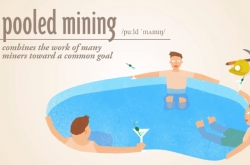The main goal of the St. Petersburg-based developer community Dash is to encourage specialists to get into the actively developing blockchain technology. Although the technology has been around for a while, it has just recently "matured". What is more, the infrastructure of public institutions, banks, and companies is now ready for its introduction. It is no coincidence that the blockchain boom occurred in 2016-2017, when not just technical specialists, but even those commonly indifferent to technology showed great interest in development of blockchain. For the most part, it happened because blockchain technology offers a whole different take on the exchange of goods and finances between people.
"Almost everyone has now heard about blockchain and cryptocurrency, but few understand the vast amount of effort that is put into them. Unlike other organizations that teach the mechanisms of earning money via blockchain, we focus on advanced training for those developers who will create the blockchain of the future. The current state of blockchain that is now a hot topic is already this technology's past; it mostly has to do with networks for creating e-wallets and purchasing tokens. The blockchain of the future is different, as the current execution of blockchain technology has many flaws: for instance, the high commission on transactions between users, and great capacities spent on mining. The blockchain of the future will account for these issues and offer new solutions. The most optimal protocols are being created at this very moment and by those developers who come to us," comments Dmitry Plahov.

The effect of blockchain on professions
СЕО, Founder, Co-founder
Until 2005, someone with a СЕО, founder, or co-founder position was assumed to have a serious background in business, i.e. someone who has already made a career at a major enterprise or founded their own company. Today, every startup and every team working with blockchain technology has a chief executive officer who focuses on promoting their idea. These ideas, in turn, are being worked on by marketing experts and copywriters and brought to the market, so that their most enthusiastic adherents would have the opportunity to partake in the company's development. The instrument for doing that is ICO, or Initial Coin Offering - the process of issuing shares (as tokens) that any person interested in a project can buy, thus providing financial support to the team.
Marketing expert
The role of marketing experts has also changed. While before, marketing experts were only present at major companies that released products which called for a particular positioning on the market, there is now one at every startup. Their task is to fashion the idea in such a way that it will be easier to promote it to the target audience and attract funding.
Copywriter
Copywriters used to mostly work for big companies with dedicated PR departments that managed newsletters and press releases. Nowadays, copywriters, much like marketing specialists and CEOs, exist in every blockchain team. Their role is to create One Pagers (single pages explaining a project's goal, plans, and methods of completing them) and White Papers (more detailed, stepwise explanations), which have become the most common methods of communication with the target audience.

Community manager, PR
After a startup enters the market, it needs a community manager. If the startup is a small one, and its idea is focusing of a specific niche in the market, few people will be really interested in it, and it is necessary to communicate with them, inform them of the recent achievements and increase their number. Community managers promote their projects via social networks and at different events. On the whole, they collaborate with copywriters and marketing experts in order to effectively promote their project's idea to a target audience.
Miner
As such projects are based on blockchain technologies, they need volunteers who will mine, i.e. create blocks that will be used by the project for further development. Nowadays, miners are many, as every network creates blocks in some way or another. Blocks are mined using special hardware. Miners are usually compensated by the network (in coins, for a particular amount of blocks), which is a miner's key stimuli.

Trader, investor
A project has to enter the stock market so that potential investors would learn about it, and those who have already invested in it would understand that they didn't do it for naught. Entering the stock market is considered an important step forward. In order to survive on the stock market and trade shares effectively, a project needs dedicated professionals: traders and investors who can shape the brokers' and investors' opinion of the project in the desired manner. Traders and investors have developed algorithms that allow for trading on those stock markets where it's most effective, and thus make the project's presence in this market important for the project.
Escrow
Oftentimes, investors who have just heard about a particular project find it hard to put their trust in it, and it is the escrows whose role is to settle their doubts. Escrows are people who have already made a reputation in the market, and can use it to affirm a new project's viability. Escrows ensure investors that they would get income, and also work with legal professionals and enter agreements that confirm further payments.
CTO, CIO, team lead
As all blockchain startups are based on an IT infrastructure and are IT products in general, their teams need CTOs (Chief Technology Officers), CIOs (Chief Information Officers), or team leads.

Developer
The position of a developer in a blockchain company is a lot different from that of developers who work for a regular company that can guarantee fixed compensation. In a startup, the latter is just impossible, and the developer has to quickly produce good results. The difference here is in that the developer has to also think like a startupper, be motivated and demanding of both themself and the product. They come to work for the company for a short term, have comprehensible assessment criteria, and sometimes get a share in the company.
Blockchain developer
Blockchain developers are, in a sense, the next step of a developer's evolution. Most specialists believe that a developer can choose a particular field (i.e. become a frontend or a backend developer) or work only in the particular programming language that they prefer. Blockchain developers work on decentralized applications and thus have to understand that the application has to work in specific conditions (as a blockchain network can incorporate equipment in different parts of the world, it cannot be standardized). So, blockchain developers have to consider all possible options of launching their application in every possible environment and understand how it will react to different malfunctions and emergencies. Blockchain developers have to possess top-notch skills, know the latest news in their field and attend various events.
Where does one study to become a blockchain developer?
As of today, there aren't many blockchain developers, and the demand for them continues to grow. Speaking of St. Petersburg, there are several specialists who offer training in this field. For one, those would be Aleksander Mazaletsky, member of the Dash community and lecturer for ITMO University (Aleksander gave a semester-long course on blockchain), Dmitry Mishunin, founder of the HashEx project, and Mikhail Lazarev, founder of Tokenstarter.





